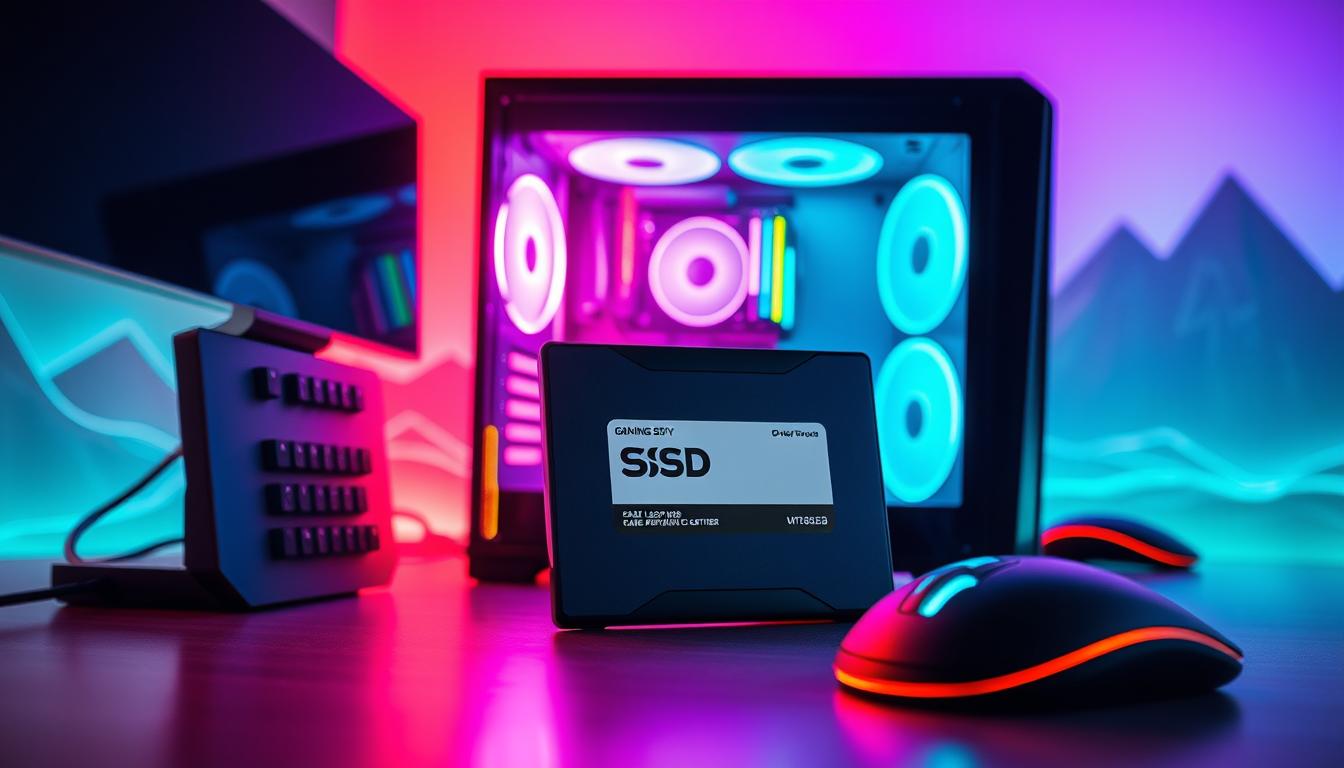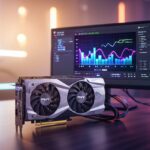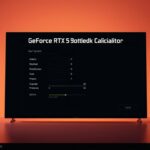Last Updated on July 16, 2025 by Gill
For avid gamers, finding a seamless experience is a constant quest. A key factor often overlooked is storage. Gaming storage bottleneck can greatly affect performance, leading to frustration and lag.
Imagine starting your favorite game, only to face slow loading times and stuttering. This is a common problem many gamers deal with. But, they often don’t know the main cause is their storage choice.
Deciding between SSD and traditional hard drives can be tough. But knowing their differences is essential for a better gaming experience. Let’s explore how your storage choice can improve your gameplay.
The Hidden Performance Killer in Gaming Setups
Gaming performance often focuses on the GPU and CPU. But, storage is a key component often ignored. Gamers spend a lot on graphics cards and processors. Yet, the storage drive, whether HDD or SSD, can slow down their games.
Why Storage Often Gets Overlooked
Storage is a hero in gaming rigs, but it’s often ignored. Unlike GPUs and CPUs, storage isn’t updated often. This can cause a big gaming hardware bottleneck.
The HDD disadvantages for gaming are clear. They lead to slow load times and a less responsive system.
Many gamers don’t know about the SSD vs HDD performance until they try an SSD. SSDs are faster, making games load quicker. This is key for games with big worlds.
The Real Impact of Storage on Gaming Experience
The storage drive’s effect on gaming is huge. Games with big worlds need fast storage to run smoothly. An SSD makes games load faster and run smoother. An HDD can cause frustrating pauses.
Knowing the SSD vs HDD performance is key for gamers. Choosing the right storage can make games more enjoyable. It helps avoid the gaming hardware bottleneck.
Understanding Storage Technologies: HDD vs SSD Explained
Knowing the difference between SSD and HDD is key for better gaming. The storage you pick can change your gaming, from how fast it loads to how it feels in-game.
How Hard Disk Drives (HDDs) Work
Hard Disk Drives (HDDs) use old-school parts to read and write data. They have spinning disks, motors, and heads that move to get data.
Mechanical Limitations of Traditional Storage
HDDs have mechanical issues and slow access times. This is because their parts move physically.
HDD Speed Factors: RPM and Cache
HDD speeds depend on RPM and cache size. Bigger RPM and cache can help, but they’re limited by being mechanical.
Solid State Drive (SSD) Technology Explained
Solid State Drives (SSDs) use flash memory chips to store data. They’re faster and have less delay than HDDs.
Flash Memory Architecture Benefits
SSDs access data electronically. This cuts down seek times and boosts performance.
Different Types of SSDs on the Market
SSDs come in SATA, NVMe, and M.2 types. Each has its own interface and speed level.
NVMe vs SATA: Speed Differences That Matter
NVMe SSDs are way faster than SATA SSDs. They connect directly to PCIe, making them great for gaming.
NVMe SSDs can go up to 7000 MB/s. SATA SSDs top out at about 550 MB/s.
| Feature | HDD | SATA SSD | NVMe SSD |
|---|---|---|---|
| Speed | Up to 200 MB/s | Up to 550 MB/s | Up to 7000 MB/s |
| Access Time | 5-10 ms | 0.1-0.2 ms | 0.05-0.1 ms |
| Interface | SATA | SATA | PCIe |
SSD vs HDD Gaming: The Bottleneck Nobody Talks About
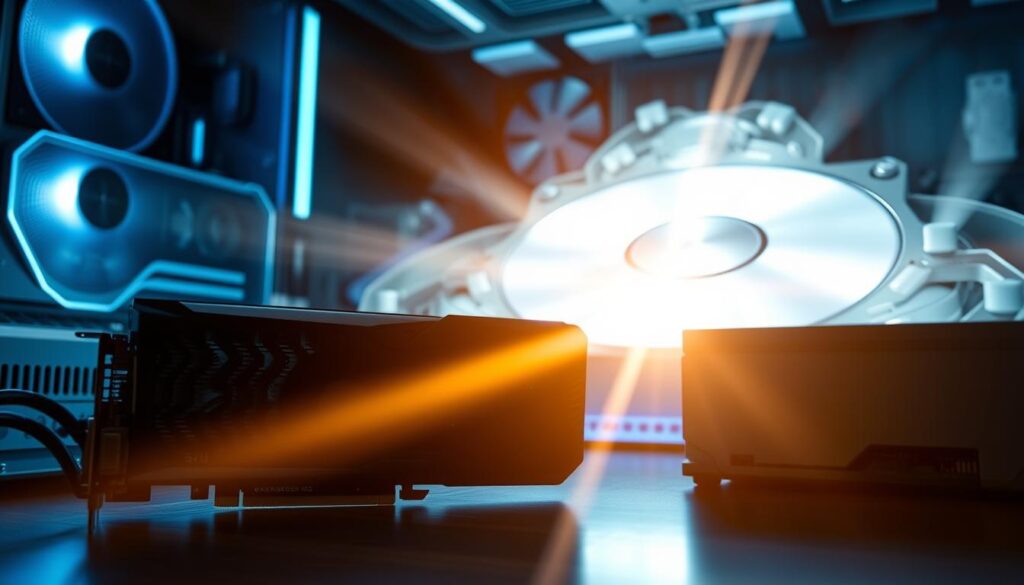
Gamers often focus on upgrading their GPUs and CPUs. But, a hidden performance killer is their storage choice. The debate between SSD and HDD for gaming is ongoing. Many gamers don’t know how much storage affects their gaming experience.
The Data Transfer Bottleneck Explained
SSDs and HDDs differ in data transfer speeds. SSDs are much faster than traditional Hard Disk Drives. This speed difference is key in gaming, where quick data access is essential.
SSDs handle multiple read/write operations without a big performance drop. HDDs, on the other hand, have mechanical limits.
In gaming, SSDs offer a smoother experience. They load game environments, textures, and data quickly. This reduces in-game stuttering or lag.
Load Time Disparities in Modern AAA Games
Modern AAA games are very data-intensive. They have complex graphics, detailed textures, and large open worlds. The storage drive’s role in loading these games is critical.
Games like “Cyberpunk 2077” or “Assassin’s Creed Odyssey” load slowly on HDDs. They can take several minutes to start. SSDs, on the other hand, can cut these times by 70-80%.
Faster load times mean less waiting and more playing. This improves the gaming experience and enjoyment.
When Your Storage Becomes Your System’s Weakest Link
In a high-performance gaming rig, a slow storage drive can be a big bottleneck. Even with a powerful GPU and CPU, an HDD can slow down the system. Upgrading to an SSD can unlock your gaming PC’s true performance. It ensures your storage isn’t slowing you down.
In conclusion, choosing between SSD and HDD for gaming is about performance, not just storage capacity. As games evolve, the need for faster storage will grow. SSDs are becoming essential for serious gamers.
Measuring the Performance Gap: Real-world Gaming Tests
Real-world gaming tests show the big difference between SSD and HDD. They help us see how storage affects gaming. This helps us choose the best one for our games.
Game Load Time Comparisons Across Popular Titles
Switching from HDD to SSD makes a big difference in load times. Games like Assassin’s Creed Odyssey and Cyberpunk 2077 load way faster on SSDs. Here’s some data to show the difference:
| Game Title | SSD Load Time (seconds) | HDD Load Time (seconds) |
|---|---|---|
| Assassin’s Creed Odyssey | 30 | 60 |
| Cyberpunk 2077 | 25 | 50 |
| Fortnite | 20 | 40 |
In-game Performance Differences During Intensive Gameplay
SSDs also improve performance during intense gameplay. They reduce texture pop-in, making games smoother. This is really important in big games where lots of data is streaming.
Texture Streaming and Open World Performance Impact
Open-world games need fast texture streaming. SSDs do this better than HDDs, making games more real. The Witcher 3 is a great example of this.
Knowing these differences helps gamers pick the right storage. It can make their gaming better.
Modern Games That Demand SSD Performance
The world of gaming is changing fast. Games today are more complex and detailed. They need faster storage to run smoothly.
Modern games, like open-world and next-gen titles, use SSDs for a better experience. This means faster loading and smoother gameplay.
Open World Titles and Their Storage Requirements
Open-world games have huge, detailed worlds. They need fast storage to load and stream assets quickly. These games have big maps, complex textures, and lots of details.
Case Study: Cyberpunk2077 and Red Dead Redemption2
Cyberpunk 2077 and Red Dead Redemption 2 are great examples. They have huge worlds, detailed characters, and complex stories. SSDs make these games load faster, giving players a better experience.
Battle Royale Games and Asset Loading
Battle Royale games like Fortnite and PlayerUnknown’s Battlegrounds (PUBG) also need SSDs. They have fast action and need quick asset loading. SSDs help players get an edge by loading games faster.
Next-Gen Games Designed for SSD Architecture
Next-generation games are made with SSDs in mind. They load quickly and stream data efficiently. This makes for a more immersive gaming experience.
SSDs offer many benefits for gaming:
- Faster load times
- Improved texture streaming
- Enhanced overall gaming performance
The Cost-Benefit Analysis: Is an SSD Worth It for Gaming?
Thinking about getting an SSD for gaming? You’re likely wondering if it’s worth the money. Switching from a traditional HDD to an SSD is a big decision. It depends on the cost and the benefits SSDs bring.
Price Per Gigabyte Comparison Over Time
SSD prices have dropped a lot over time. They’re now closer to HDD prices per gigabyte. A few years back, SSDs were way more expensive. But now, thanks to tech improvements, SSDs are more affordable for gamers.
Performance Gains vs. Financial Investment
Switching to an SSD can greatly improve your gaming. You’ll see faster load times and a quicker system. The cost of an SSD is worth it for these benefits. For example, big games load up to 3 times faster on SSDs.
- Faster Load Times: SSDs can load games up to 3 times faster than HDDs.
- Improved System Responsiveness: SSDs reduce lag and stuttering, providing a smoother gaming experience.
Long-term Value Proposition and Durability Factors
SSDs are also durable and use less power. They don’t have moving parts like HDDs, so they’re less likely to break. This makes SSDs a smart choice for gamers who want a reliable system.
In summary, SSDs might cost more upfront than HDDs. But their speed, durability, and falling prices make them a great choice for gamers.
Hybrid Storage Solutions for Gamers on a Budget
Hybrid storage solutions are a smart way for gamers to save money without sacrificing performance. They mix the speed of Solid State Drives (SSD) with the storage of Hard Disk Drives (HDD). This combo gives gamers quick load times and better performance without the high cost of big SSDs.
SSD for OS and Favorite Games, HDD for Library Storage
Hybrid setups usually put your OS and top games on an SSD. Your big game library goes on a HDD. This way, you get fast SSD load times for your favorites, and your whole library is on the HDD.
Optimal Game Selection for SSD Installation
Choose games for your SSD based on their need for fast load times. Look for:
- Games with large open worlds
- Multiplayer titles with frequent loading
- Games with high graphics requirements
Managing Game Libraries Across Multiple Drives
Organizing your games across drives needs some planning. Use:
- Game launchers that support multiple library locations
- Folder redirection for game installations
- Regular library audits to optimize storage usage
Using Smart Storage Management for Optimal Performance
To make the most of your hybrid setup, manage your storage wisely. Keep an eye on usage, update games and OS often, and make sure your SSD has enough room.
Key benefits of hybrid storage include:
- Cost savings compared to using a large SSD
- Improved performance for critical games and applications
- Flexibility to store large game libraries on HDDs
Future-Proofing Your Gaming Rig: Storage Considerations
The future of gaming storage is exciting, with new tech promising big improvements. It’s key to know how these changes will affect gaming rigs. Gamers should think about how to make their systems ready for the future.
DirectStorage and Next-Gen Gaming Technologies
Microsoft’s DirectStorage is a big leap in gaming storage. It’s made to minimize load times and maximize performance. Games can load data straight to the GPU, skipping the CPU and old storage problems.
This tech changes how games are made and played. It makes fast storage even more important for gamers.
Upcoming Storage Innovations Gamers Should Watch For
There’s more than DirectStorage on the way. PCIe 5.0 and PCIe 6.0 will bring even faster speeds. These updates will cut down on data transfer delays, making games smoother.
New tech like Storage-Class Memory (SCM) is also coming. It mixes DRAM and NAND flash for super-fast, low-latency storage. Though it’s new, it could change how we store and access data in gaming rigs.
In short, the future of gaming storage looks great. With tech like DirectStorage and new storage ideas, gaming will get even better. Gamers should keep these advancements in mind when upgrading their rigs.
Practical Upgrade Guide: Transitioning from HDD to SSD
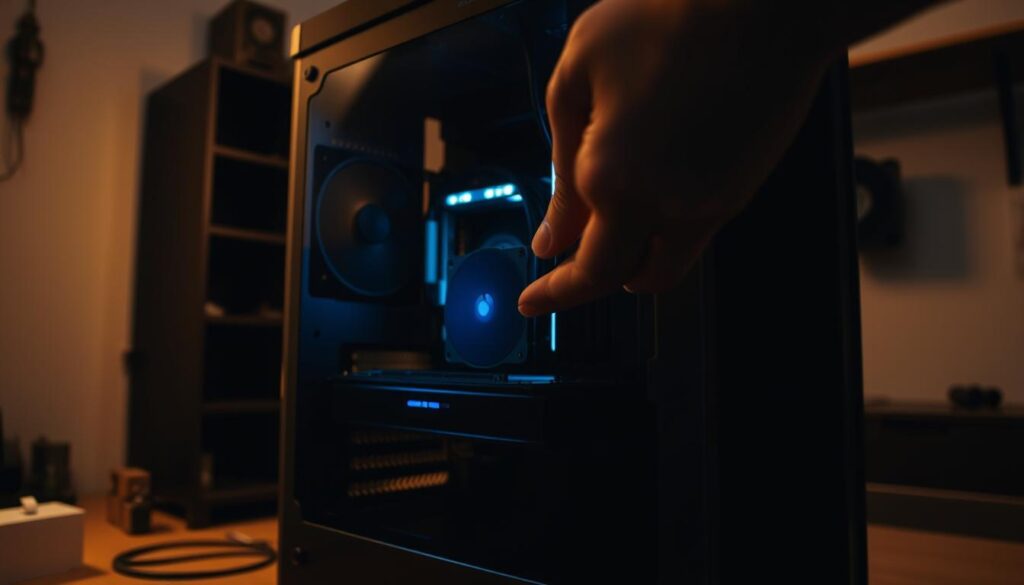
Switching from HDD to SSD can make your gaming experience better. You’ll enjoy faster load times and smoother gameplay. Upgrading to SSDs offers many benefits, but it’s important to plan carefully.
Selecting the Right SSD for Your Specific Gaming Needs
Choosing the right SSD is key for great gaming. You need to think about the SSD interface and how much storage you need for games.
SATA vs. NVMe for Different Gaming Scenarios
SATA SSDs are a good first step, but NVMe SSDs are faster. They’re best for:
- High-end gaming rigs where every millisecond counts
- Gamers with high-performance systems that can leverage NVMe speeds
- Those who want the future-proofing that NVMe technology offers
Capacity Planning for Modern Game Libraries
Modern games take up a lot of space. When picking an SSD size:
- Think about how big your current game library is
- Think about future games and how big they might be
- Find a balance between cost and how much storage you need
Installation and Data Migration Tips for Gamers
After picking your SSD, it’s time to install and move your data. Here are some tips:
- Use cloning software to move your data to the new SSD
- Make sure your SSD is connected right and your system sees it
- Think about doing a fresh install of your OS and games for the best performance
Optimizing Your System After Upgrading Storage
After switching to an SSD, there are steps to make your system better:
- Update your storage drivers to the latest version
- Enable TRIM to keep your SSD running well
- Adjust your game settings to use the SSD’s full power
By following these tips, you can make a smooth switch to SSD. This will improve your gaming experience a lot.
Conclusion: Unleashing Your Gaming Performance with the Right Storage
Gaming isn’t just about graphics or processors. Storage is key to a great gaming experience. The SSD vs HDD debate shows SSDs are faster, with quicker load times and less lag.
Often, storage is the bottleneck in gaming. HDDs can slow down your system. Knowing the difference between SSD and HDD helps gamers choose better storage for better gaming.
Switching to an SSD boosts gaming performance. It cuts down on load times and makes your system more responsive. As gaming tech advances, SSDs will become even more important for gamers.
- NVIDIA RTX 6000 Ada Generation 48 GB Bottleneck Calculation - October 17, 2025
- Optimize Your GeForce RTX 5070 Performance with Our Bottleneck Tool - October 2, 2025
- GeForce RTX 5090 Bottleneck Calculator: Optimize Your Setup - October 1, 2025

